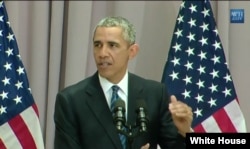Democratic U.S. Senator Harry Reid has expressed his support for the agreement the United States and five other nations reached with Iran to limit the country's nuclear program in exchange for sanctions relief.
The Senate Minority Leader called the deal "the best path to stop Iran from obtaining a nuclear weapon" in a statement Sunday.
His support makes it less likely that Republicans in Congress will be able to muster enough votes to block the agreement, which they and Israel criticize as leaving Iran with too much of a nuclear program while unlocking billions of dollars.
Reason behind decision
Reid said part of his support for the deal lies in what he called the lack of any viable alternative put forth by those who oppose it.
"It is a fantasy to say that if Congress rejects the agreement, the administration can simply go back and get a better agreement," he said. "That is not a real option and we should not pretend that it is."
He also emphasized his view that the negotiations by the U.S., Britain, China, France, Russia and Germany resulted in terms that will help protect ally Israel from the possibility of being threatened by a nuclear-armed Iran.
"Ensuring Israel's security is of the utmost importance to me," Reid said. "I support this deal because I believe it is the best option to halt any Iranian nuclear weapons program and therefore protect the State of Israel."
Iran's stance
Iran has long insisted its nuclear program is solely for civilian purposes and does not include a weapons program.
The international negotiations that ended in mid-July after multiple rounds and extended deadlines were aimed at ensuring Iran's program is peaceful. The agreement cuts back Iran's nuclear activity to lengthen the amount of time it would take for Iran to get itself to a place where it could potentially build a nuclear bomb, and includes the threat of reimposing the harsh sanctions that have badly hurt the country's economy over the past decade.
Before the deal was reached, the U.S. Congress demanded President Barack Obama give lawmakers a chance to review any agreement before it went into effect, the result of which is a 60-day period that runs out on September 17. Congress has until then to vote for or against the terms, in effect choosing whether to allow the sanctions it has imposed to be lifted and thus completely fulfill the U.S. side of the deal.
Obama promises veto
But Obama has promised use his veto power if lawmakers vote against the agreement. The House of Representatives and the Senate could then try to override the veto, a rare mechanism that requires two-thirds of each chamber to agree.
Republicans hold majorities in both the House and Senate, but not so big that they can achieve a veto override on their own.
To block a possible override, Obama needs the support of 34 Senators. With Reid, he has 27 Senate Democrats who have said they are for the deal, while another 15 have not yet publicly declared a position. Democrats Chuck Schumer and Robert Menendez said they will vote against the deal.
In the larger House of Representatives the situation is less clear, with about a third of the members not yet publicly saying how they would vote. But of those who have taken a position, 16 Democrats have said they will not support the agreement. House Republicans would need at least 27 more Democrats to join their side to reach the two-thirds threshold.
Congress will focus on the Iran nuclear deal when it returns from recess on September 8.







